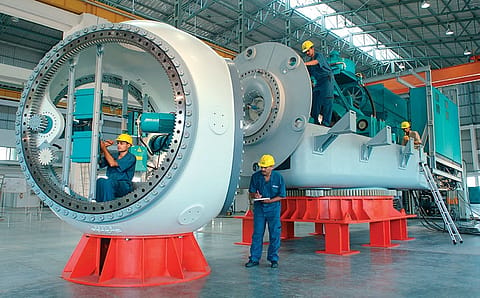Suzlon, a renewable ‘loan’ company is back to raising funds; should you invest?
It seems the previous capital raised by Suzlon has been blown away and the company is going back to its existing shareholders for raising fresh capital worth ₹1,200 crore through a rights issue.

Suzlon, a renewable energy company, may also be called a ‘renewable loan company’. Considering the record number of loan restructuring and financial rescues the company has availed of in the past decade.
It is surprising that while value destroyers like JP Associates, Reliance Communications and Reliance Power have been shunned by both financial institutions and retail investors, the same institutions and public retained faith in Suzlon even as it toppled from being a Nifty Fifty Stock to the Penny Stock category. Over 22 lakh retail investors invested in Suzlon, the wind turbine manufacturer, while PSU banks and astute industrialists like Dilip Shanghvi, the founder of Sun Pharma, invested in the company to keep the turbines rotating.
Dilip Shanghvi played a venture capitalist’s role for Suzlon in 2015 and infused ₹1,800 crore into the ailing wind company. By infusing the working capital, Shanghvi got a 23% stake in the company.
However, despite the infusion of capital by Shanghvi and multiple financial restructurings by banks, Suzlon could not quite regain its energy. By mid-2022, the renewable energy company needed a White Knight to revive. This time, government-backed institutions came to breathe new life into Suzlon. In June 2022, Rural Electrification Corporation and the Indian Renewable Energy Development Agency (IREDA) bought Suzlon’s loan from a consortium of 16 banks. After a decade of patience with the company, the consortium of lenders led by the State Bank of India, took a call to sell the Suzlon loan portfolio to REC and IREDA.
Despite the company going through multiple rescue missions, financial institutions continued to back its management. All this while, the Tanti family led Suzlon, even when the company survived many near-death experiences during their reign.
This was at a time when institutions decided to withdraw the backing of several other corporate titans such as Gaurs of Jaypee Group, Jhawars of Usha Martin, Singhals of Bhushan Steel & Power and Ruias of Essar Steel.
However, the Tantis are back in the game of renewing the financial energies of Suzlon and financial institutions, government-backed REC and IREDA and the Indian retail crowd would again get the opportunity to show their faith in the company, if any. It seems the previous capital raised by Suzlon has been blown away and the company is going back to its existing shareholders for raising fresh capital worth ₹1,200 crore through a rights issue.
Recommended Stories
And how will it raise ₹1,200 crore? By diluting its equity base further. Even when Suzlon already has 1,000 crore outstanding shares, it is gearing up to issue approx. 247 crore new shares. So after the dilution, the outstanding shares of Suzlon would be around 1,247 crore. That would get Suzlon to the top 10 on an outstanding shareholding basis.
Investors need to remember the golden equation of valuation, which states that just to achieve an earning per share of ₹1, Suzlon needs to make a net profit of ₹1,247 crore as earning per share equals net profit divided by outstanding shares. Going by the past performance, it looks tough that Suzlon would make a turnaround and clock such profits.
Saga of renewable loans
Tanti set up Suzlon in the mid-1990s and it came up with a ₹1,500 crore IPO in 2005. The company’s IPO was over-subscribed 15 times. At its peak in 2009, Suzlon's market cap crossed ₹68,000 crore. Currently, it sports a market cap of less than ₹8,000 crore, translating into an over 85% loss from its peak.
(INR CR)
In mid-2012, Suzlon defaulted on the repayment of $209 million worth of Foreign Currency Convertible Bonds (FCCBs), the biggest at that time. In 2013, a consortium of banks led by SBI restructured ₹9,500 crore of loans and leased a new breath of life in it. But the company was struggling to regain its past glory and in 2015, Sun Pharma promoter Dilip Shanghvi infused ₹1,800 crore into the company.
But these initiatives went in vain and in May 2019, Suzlon again defaulted on the repayments of bonds worth $172 million. Suzlon’s debt was piling up. In 2020, Suzlon and Tanti family got another lifeline when SBI led consortium restructured a whopping ₹14,000 crore debt. Surprisingly, lenders took a massive 65% haircut on loan but Tulsi Tanti remained the face of the company. Why lenders backed the Tanti family is a question that baffled many retail investors who were sitting on massive losses, with Nifty Fifty stock turning into a penny stock. After many failed attempts of resurrecting Suzlon, finally, in mid-2022, the bankers’ consortium sold over ₹4,100 crore of Suzlon loans to government-backed REC and IREDA.
Why rights issue, not FPO or preferential allotment?
A listed company can raise equity through many ways like preferential allotment where shares are allotted on a preferential basis to a select group of investors or follow-on public offer (FPO) where additional shares are issued to existing or new shareholders. Suzlon chose the path of rights issue where only existing shareholders are entitled to participate in the issue. Why?
For beginners, this will ensure the Tanti family stays at the helm of affairs by maintaining their existing shareholding of approx. 15%. Tantis pitched hard that they are committed to Suzlon. The family is subscribing to its share of the rights issue and so is Dilip Shanghvi. It needs to be seen whether 22 lakh retail investors, who are patiently waiting on the counter, will respond with the same faith in Suzlon.